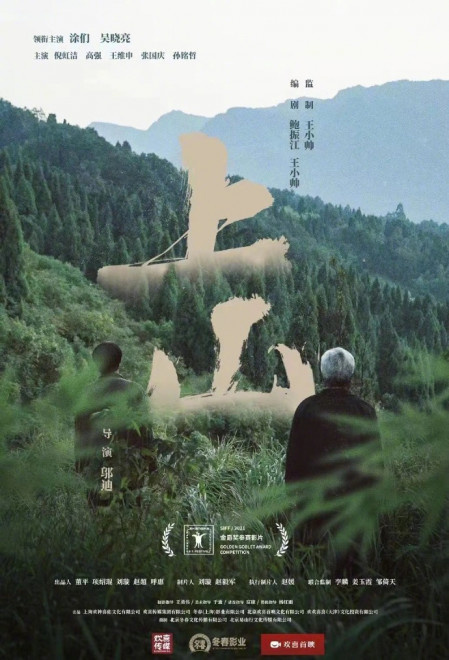
"Up the Hill" poster
On the day before the closing of this year's Shanghai Film Festival, Wang Xiaoshuai supervised the premiere of the new film "Shangshan", competing for the main competition unit of the Golden Jubilee Award, and was also one of the three Chinese films shortlisted for the film.
Director Wu Di is a photographer with Whom Wang Xiaoshuai has worked with for thirty years, and together he has filmed "Qinghong", "Left and Right" and "Intruder". "Up the Mountain" is wu di's first feature film to transform into a director, and Wang Xiaoshuai not only served as a producer, but also participated in the creation of the script. The main actors found old drama bones, Wu Xiaoliang, who had outstanding performances in "The Twelve Hours of Chang'an" and "Under the Sun", and Ni Hongjie, who was "peerless".
The story begins with the figurative action of "going up the mountain", in which the retired old criminal policeman played by Tu Men goes up the mountain alone, follows his steps, and goes all the way to a dilapidated temple on the mountain. Here, he seeks out Li Baocai, a murderer who escaped from him decades ago, and the monks in the temple look very similar to Li Baocai.
This is a fairly traditional police pursuit theme, as a crime genre film, it also lays out suspense step by step: why did the old criminal police insist on arresting Li Baocai, what crime did he commit, was the monk in the temple Li Baocai, and what was Li Baocai's criminal motive... These suspense points are effective "hooks" to lead the story forward, but because of the repeated insertion of flashback memories of old criminal police officers and murderers, this old-school method of explaining key information quickly gives the answer almost completely, dissolving the suspense, and this narrative structure gradually cools the audience's curiosity.
The good thing is that entering the isolated mountains and old forests and temples from the unknown perspective of the old criminal police can indeed bring the audience a sense of tension and psychological horror in the "secret room exploration", which is a point that the film successfully achieves. It also tries to form a whole new path in a spatially scheduled way into this somewhat outdated story.
The two enclosed spaces of the mountain forest and the temple set up a dramatic interpretation stage for the police and bandits to chase after me, especially when Li Baocai chased and killed the old criminal police in the temple, the two shuttled through various cramped houses, the lens language and the character's action modeling scheduling, light and shadow design cooperated with each other, forming characteristics in the visual narrative, resulting in a touch of the Coen brothers' classic movie "Blood Labyrinth" and "Old No One".
The main creators of "Shangshan" appeared at the Shanghai Film Festival: Wu Xiaoliang, Wu Di, Tu Men, Ni Hongjie (from left to right)
However, in order to create a thrilling atmosphere, the film uses too many startling soundtracks, the director lacks stylistic skills, and the image expression is not exquisite and mature, so that the overall effect is discounted a lot.
The title of the film "Up the Mountain" is a pun, and the film also uses a line to point out the core theme: "It is easy to go up the mountain and it is difficult to go down the mountain" .
Li Baocai made the mistake of killing people in one thought for love, and even if he fled to the mountains and forests, surrounded by the protection of God and Buddha, it was difficult to get rid of the crime and punishment in his heart, and under the persistent belief of the old criminal policemen who insisted on pursuing the murderer for decades, it was even more difficult to escape the trial of justice and law.
The film frames the scene in an ancient temple that gathers Confucianism and Buddhism, and uses the same actor to play the monk and the murderer, but the murderer's inner conflict and changes are not fully unfolded, and the mirror relationship between him and the monk is not fully explained. Therefore, these designs, which are designed to convey Zen and human redemption, regret only stay on the surface.
Li Baocai's criminal inducement is revenge for love, and his emotional entanglement with the women of the troupe has disturbed, so that the film eventually falls into the love drama template often found in crime films, mediocre and old, lacking in novelty.
It is the solid acting skills of several leading actors that support this movie. Tu Men performed a patient with diabetes, stroke and hypertension, delicately designed the detail of facial convulsions for the character, and interpreted the indomitable righteousness of the old criminal policeman. Tu Men also has many action scenes of fighting with their opponents in the film, and they have paid a lot of physical strength.
Wu Xiaoliang plays two roles alone, and makes obvious differences from appearance characteristics to performance styles. Although Ni Hongjie does not have many scenes, in fragments and fragments, she plays the different faces and states of a woman at different times, the beauty and vitality of youth, the exhaustion and decay of old age, and the forbearance and unwillingness when confessing guilt and confessing to the law, all of which try their best to do enough in the limited play space.
"It's easy to go up the mountain and it's hard to go down the mountain", this movie can also be described as such. It's easy to think of a new way to shoot crime genres, but it's not so easy to conquer the audience to succeed.